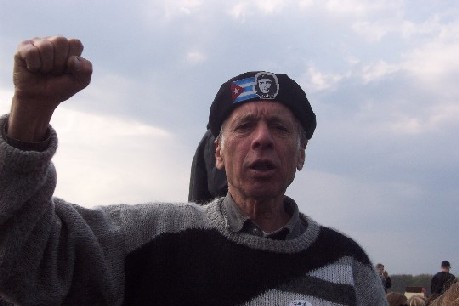(This article is the first of seven pieces dedicated to the Cuban revolution and its defeat of the US imperialist invasion 50 years ago, April 17-19, 1961, and embraces my half-century struggle.)
I. Sharing Che’s Activism
Che’s penetrating eyes stare at me seriously as I write about him. It is strange that I have never written about him before, other than to quote him. Perhaps it is because Che has been too large a figure for me to tackle? I don’t know. This writing, though, is a commemoration of Che and of my 50 years in our common struggle.
Ernesto Guevara was my greatest personal inspiration and Cuba’s revolution was my greatest collective inspiration—along with the Vietnamese resistance fighters. Nicknamed Che, an Argentine expression, he lived and died as he preached. Che’s internationalist ideals, his consequent actions, his integrity and charm, have influenced my life all these decades.
What immediately attracted me was his forthright manner of speaking and writing, and his bravery and fairness in battle. Che’s dream was to liberate Latin America from the shackles of United States imperialism and its lackey national dictators and murderous straw men. This would be followed up by worldwide socialist revolution.
“I am Cuban and also Argentine…patriotic for Latin America…in the moment it might be necessary, I am disposed to offer my life for the liberation of whichever of the Latin American countries without asking anything of anyone.”
Those are his prophetic words printed on a calendar of photos, which I recently bought in the school room at La Higuera, Bolivia where he was murdered. The images of Che on my walls are important to me, as are some slogans, such as Fidel’s: “To be internationalist is to settle our own debt with humanity”—a moral displayed on Cuban billboards.
I began to share Che’s dream as my first life, that of a follower of the brutal and chauvinist American Dream, drew to a close. In my family, you were either an active American Dreamer, like my career militarist father, or a passive one like my grandmother, whose motto was: “Ignorance is Bliss”. I came to feel that these codes rejected other people. When I severed that knot, I entered a world of humanistic vision and struggle. I still see myself as a youth of the 60s, when many of us across the world fought the profiteering war-making empire-builders.
 The author, Ron Ridenour
The author, Ron Ridenour








